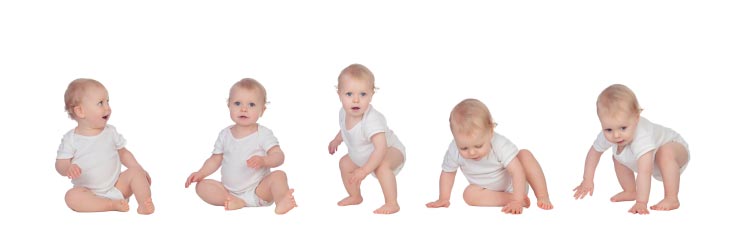Watching your infant grow and develop is one of the most exciting aspects of parenthood. Each new skill and behavior is a sign of progress and development. Understanding these early milestones can help parents ensure their child is developing at a healthy pace and provide insights into how to support their growth effectively. This article outlines key early development milestones from birth to one year and offers guidance on what parents might expect during these initial stages.
Birth to 3 Months
During the first three months, your infant is adapting to the world outside the womb. This period is about sensory and physical development, including:
- Visual Tracking: Infants start to focus on and track objects with their eyes. Initially, they can see only about 8 to 12 inches away—the perfect distance to gaze at a parent’s face.
- Smiles: The first real smiles begin around 6 to 8 weeks. This is not just a sign of gas—your baby is genuinely responding to interactions, often smiling at familiar faces.
- Motor Skills: While their movements are mostly reflexive at this stage, you’ll notice them start to briefly hold objects and swipe at dangling toys.
- Sounds: Babies begin to coo and make soft, throaty sounds during these months, often in response to your voice or actions.
4 to 6 Months
This stage is when the fun really starts, as your baby’s personality begins to shine through:
- Rolling Over: Most babies learn to roll over from their stomach to their back between these months, and soon after, they’ll roll back to stomach.
- Babbling: Expect to hear more varied sounds, including “babbles” that mimic real speech patterns.
- Grasping: Your baby will start to grasp and reach for objects with purpose, not just reflexively.
- Social Interaction: They will begin to show enjoyment at social interactions, often expressing delight through giggles and squeals.
7 to 9 Months
Babies become increasingly interactive and mobile during this period:
- Sitting Up: Most babies can sit without support, freeing their hands for exploring and playing.
- Crawling: Some babies start to crawl at this stage, although scooting on their butt or rolling around is also common.
- Stranger Anxiety: Babies begin to develop a sense of familiar and unfamiliar faces. It’s normal for them to show anxiety or clinginess around strangers.
- Weaning: This is a good time to introduce solid foods, which can include pureed fruits and vegetables. Watch for signs they’re ready, like showing interest in what you’re eating.
10 to 12 Months
As your baby approaches their first birthday, they are honing the skills they’ve learned over the year:
- Standing: By now, they might pull themselves up to stand and may even begin to take steps with support.
- Fine Motor Skills: Improved coordination allows them to do things like turn pages in a board book, pick up small items between thumb and finger, or bang two blocks together.
- Problem Solving: You might notice your baby start to figure things out by trial and error, such as finding hidden objects or understanding that buttons on toys cause certain effects.
- First Words: Many babies start to say their first clear words like “mama” or “dada,” and they’ll use their voice to get attention.
Supporting Your Baby’s Development
- Engagement: Talk, read, and sing to your baby regularly. This interaction helps with cognitive and language development.
- Play: Encourage playtime with a variety of safe toys that stimulate different senses and promote motor skills.
- Routine: Establishing a routine helps babies feel secure and manage transitions between different activities throughout the day.
- Healthcare: Regular check-ups with a pediatrician are crucial. These visits are opportunities to discuss your baby’s development and address any concerns.
Conclusion
Understanding and tracking developmental milestones in the first year of your baby’s life can reassure you about their growth and alert you to any potential concerns to discuss with a healthcare provider. Remember, all babies develop at their own pace, so these milestones should be treated as guidelines rather than strict deadlines. Celebrate each new skill and provide a loving, stimulating environment that supports your baby’s growth and exploration.

